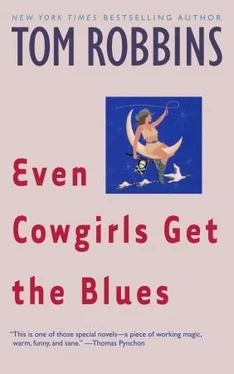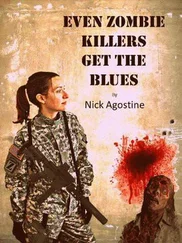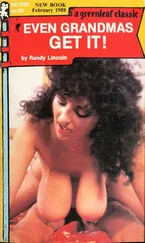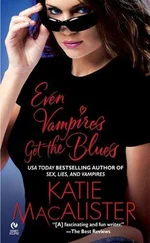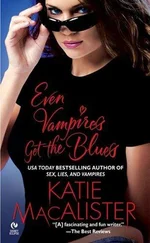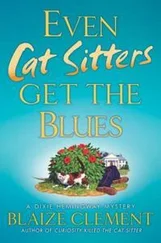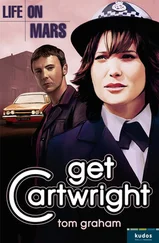On the surface, to the untrained eye, Sissy was hitchhiking as well as she ever had. She had even developed some new wrinkles. Such as using both thumbs at once, addressing one appendage to the far lanes of traffic while causing the other to beckon wittily to the cars passing closest to roadside. She had also perfected a high bouncing roll to the left, comparable to the “American twist” service in tennis. It was flashy but there was no real joy in it, no substance or spontaneity. It was what is known as a virtuoso performance. It lacked soul. You know. Show biz is teeming with performers like that, all of them with more tiles in their swimming pools than you or I have.
A sense of urgency had crept into her style. Whereas in the past Sissy had kept up her astonishing pace out of sheer exhilaration at being unique and being free, she now kept going because she was afraid to stop. For when biological necessities did force her to stop, time and space, which she had heretofore held in abeyance (as if she were some clockworks personified), fell in on her in a gravitational rush. Time and space fell in on her like a set of encyclopedias falling off a missionary's shelf onto a pygmy. And time brought along its secretary, memory, and space brought its brat, loneliness.
In the past, she had been subjected to ridicule, pity, awe and lust. Now, she was being subjected to tenderness and need. It was better and worse. As do many strong people, she had fallen victim to the tyranny of the weak.
As for Julian, he took to swilling Scotch. In the mornings. Before he had even had his Mother of God Wheat Flakes (or was it his Joyce Carol Oats?) One night he went to Max's Kansas City and created a minor ruckus by yelling, in a wheezy voice, “Jackson Pollock was a fraud!” A sculptor, hardly making an effort, bloodied his nose; and a perverted biology student followed him home because he thought Julian had said Pollock was a frog . (In New York, my dears, there are all kinds.) He listened to Tchaikovsky and stopped combing his hair.
Sometimes one gets the idea that life thinks it's still living in Paris in the thirties.
29.
JULIAN GITCHE'S letter caught up with Sissy Hankshaw in Cherokee, North Carolina, on Christmas Eve. She picked it up at 11:00 A.M., just before the post office closed for the holiday. After reading it twice, she escorted it into a honky-tonk (where aghast drunks reacted to her thumbs as if they were the hellish little reindeer of some kind of anti-Santa Claus) and read it again. The Countess had advanced her four hundred dollars when she got to New York back in the summer and she had enough left to buy a bottle of wine. She chose red Ripple, for old times' sake, and promptly spilled some on the letter. While a jukeboxed Bing Crosby crooned “I'm Dreaming of a White Christmas,” a postage-stamp Ike grinned his I-made-it-all-the-way-to-the-top-but-I-still-don't-understand grin through a puddle of wine. Under the plastic mistletoe, pool balls kissed. Blue lights winked from a metallic silver tree. Vulgarity called, and was answered.
Halfway through the Ripple, Sissy got up to go to the toilet and went to the phone booth instead.
Julian, holding back wheezes with a herculean effort, told her that he loved her. She protested that he didn't even know her. Abandoning all that he'd been taught at Yale, he replied that feeling was superior to knowledge.
“I love you,” Julian said.
“You're a fool,” said Sissy.
“I'm offering love and you're rejecting it. Maybe you are the fool.”
Well!
A week after New Year's, she hitched into Manhattan. With the Countess, who despised the way men behaved and women smelled, as their sarcastic witness, Sissy and Julian went to the Little Church of the Positive Thought and were married by a protégé of Dr. Norman Vincent Peale's.
Thus ended for all practical purposes what the author knows to be one of the most remarkable and least understood careers in human history.
But a career, however unusual, is not a story. And Sissy's story, dovetailing as it does with the stories of the Rubber Rose cowgirls and the clockworks Chink, and disclosing as it does the possible pancake beneath the sluggish syrup and slippery butter of life, is far from ended.
COWGIRL INTERLUDE (BING)
Under an orchard tree, drooping with cherries, cowgirls lay in the shade. They fed each other fruit. Dark juice dribbled into dimples. Cherry meat stained smiles and nostrils.
Kathy was embroidering a rainbow on the back of Heather's workshirt. Inspired, Linda rendered an all-red rainbow on Debbie's bare waist, and Kym, dipping slightly below the belt, added the pot of gold. Cherry paint.
Fruit goo began to attract flies, so the cowgirls imitated their hobbled horses and brushed them away by flinging their hair. A cloud chugged by. If it was not gone by sunset, it would be painted, too.
The forewoman, Delores del Ruby, was away from the ranch on a peyote run. Big Red was acting forewoman, and she was permitting the hands a very extended break. The goats in their charge were straying far and wide, and as for the birds, they could not be seen from the cherry tree.
Placing her New Testament back in her saddlebag, Mary asked, “Pardners, do you think this is honest, goofing off like this?”
“I don't care if it's honest if it's fun,” said Big Red.
“I don't care if it's fun if it's real,” said Kym.
“I don't even care if it's real,” said Debbie. Not everyone knew what she meant.
30.
IF YOU COULD buckle your Bugs Bunny wristwatch to a ray of light, your watch would continue ticking but its hands wouldn't move. That's because at the speed of light there is no time. Time is relative to velocity. At high speeds, time is literally stretched. Since light is the ultimate in velocity, at light-speed time is stretched to its absolute and becomes static. Albert Einstein figured that one out. There's no need to hang around the clockworks and bug the Chink about it.
Assuming that our brains will get off their fat butts, for a change, and play cosmic ball with us, allowing us to fully comprehend no time , then we might try to picture (if “picture” is the right word) what Einstein meant when he defined “space” as “love.”
Einstein knew a lot about space — he determined, for example, that beyond the expanding volume of the universe space ceases to exist, and so we have no space to contend with as well as no time —and he may have had some special insights into love, as well. The first of his two marriages was a mess, however. Einstein wed a girl with a physical defect.
It was some sort of crazy limp that plagued Mileva Marić, some eccentricity of the foot. A few days after the civil ceremony in Zurich, one of young Einstein's friends confessed, “I should never have the courage to marry a woman unless she were absolutely sound.” Well, for all that fellow might have known, it could have been the daily contemplation of Mileva's wild toes that led Einstein to perceive the wondrous workings of Nature in a way that no other scientist ever had.
But never mind. We know for a fact that it took more than a sardine of courage for the watercolorist Julian Gitche to marry the “unsound” Sissy Hankshaw. The union altered his life almost as drastically as it altered hers.
Good-by to dinner parties. Sissy was clumsy with silverware and, as previously noted, had a tendency to slosh the wine. Invitations were routinely refused, never extended. Julia Child was overtaken by dust. They gnawed Colonel Sanders drumsticks and Big Mac burgers in their apartment, alone. Julian began to complain of his stomach. Grease was giving him ulcers, he said. Sitting at the kitchen table, beneath the paper imitation Tiffany lampshade, he would peer into the hot slit of a taco and wonder who was dining that night at Elaine's.
Читать дальше
